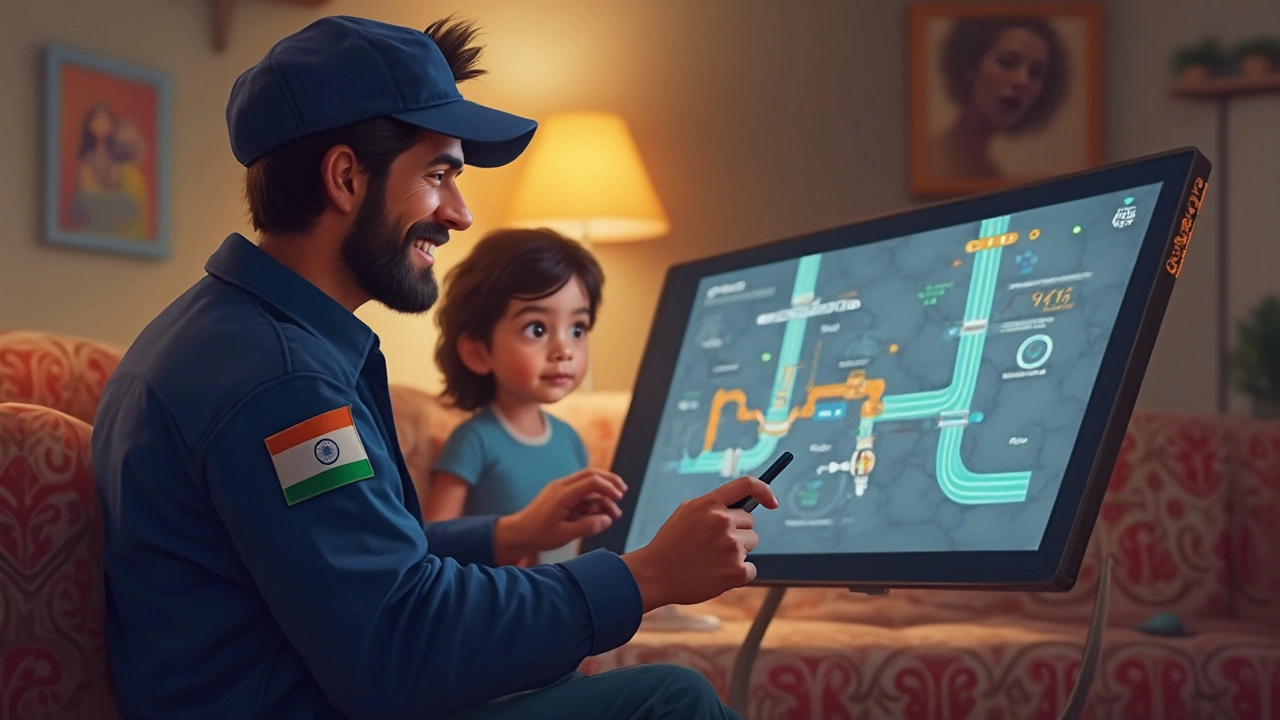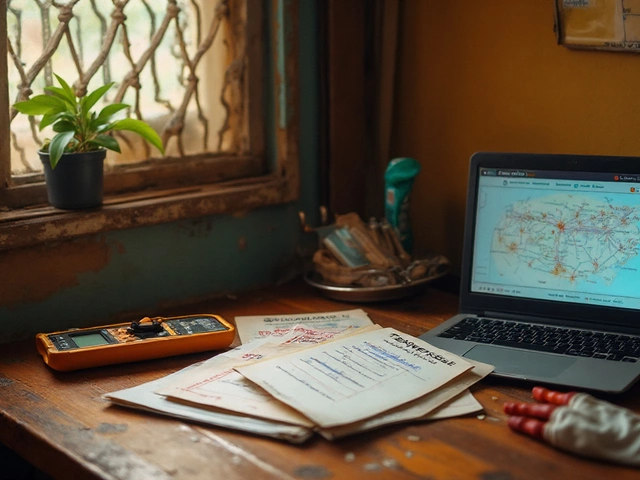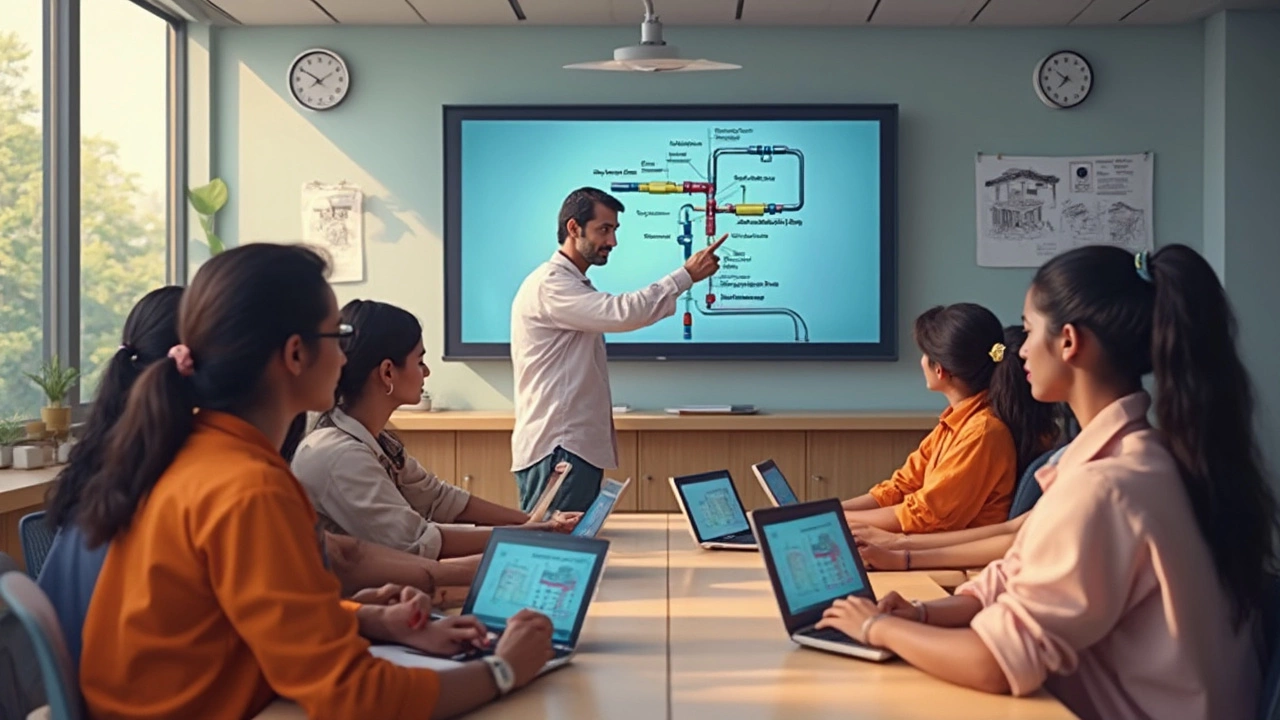Easiest Tech Course for Plumbers: Where to Start
Everybody's looking for the fast lane to a good job, right? If you want solid pay and skills that actually matter, plumbing hits the mark. But 'tech courses' can sound scary—like you'll be doing rocket science with wrenches. The truth? Some of the easiest tech courses out there are made just for newbie plumbers.
Here's the hack: you don’t need to be a genius with computers or already know how pipes work. Courses labeled "Introduction to Plumbing Technology" or "Basic Plumbing Skills" are built with total beginners in mind. These aren't crammed with confusing theory. Instead, you get the basics—think how to use the right wrench, what pipes go where, and simple safety rules.
The coolest part is that you get to actually do stuff, not just watch slides. Many training centers let you practice cutting, fitting, or even fixing a leaky faucet by yourself. Homeowners, apprentices, or anyone curious about trades will find it way less stressful than math-heavy subjects or coding classes.
- Why 'Tech' Courses Matter for Plumbers
- Which Plumbing Tech Course Is Truly Easiest?
- What to Expect in a Beginner-Friendly Course
- Tips for Passing Without Breaking a Sweat
Why 'Tech' Courses Matter for Plumbers
Ever wonder why a plumber tech course exists in the first place? Plumbing used to be all about sturdy hands and basic tools, but now, things have leveled up. Today’s plumbers deal with smart home water monitors, high-efficiency heating, and pipes that you can control from your phone. Without a little technical know-how, you’re left behind.
The best part of tech courses for plumbers is how practical they are. You’ll find out which pipes work with solar water heaters, how to handle weirdly shaped drains, and even how to use a digital leak detector. Stuff like this is becoming normal in both new builds and renovation jobs. According to the Bureau of Labor Statistics, plumbers who keep up with tech earn a solid 12% more than those who don’t bother updating their skills.
Here’s what a beginner plumber course with a technology focus can open up for you:
- Faster troubleshooting using diagnostic tools (no more guesswork!)
- Understanding energy-efficient fittings (good for eco-conscious clients)
- Safer job sites, since tech training includes up-to-date safety rules
- Better odds at high-paying jobs as construction moves digital
You might be surprised—some older plumbers admit they’re jealous of today’s new recruits because tech makes the job easier and less likely to mess up. And you don’t need to be a tech whiz. Since these skills are in huge demand, even basic courses will put you ahead of the pack.
If you’re after a plumbing skills boost or just don’t want to feel lost when someone hands you an electronic pipe locator, these tech courses are your golden ticket. The more you know, the more you’ll stand out—even against guys who’ve been at it for decades.
Which Plumbing Tech Course Is Truly Easiest?
If you're worried about picking the wrong course and getting lost, relax. Most community colleges and trade schools offer a plumber tech course for beginners. The absolute easiest option is usually called "Introduction to Plumbing Technology" or "Basic Plumbing Skills." These programs are designed for fresh starters—people who've maybe only fixed a tap at home or have zero experience.
So what do they actually cover? You’ll deal with the basics, like:
- How to identify plumbing tools and what they're for
- Types of pipes (PVC, copper, PEX—these pop up everywhere now)
- Simple jobs like tightening fittings, finding leaks, or using Teflon tape
- Staying safe on the job (think gloves, goggles, and reading warning labels)
Some schools even let you finish these beginner plumber tech courses in just 2-4 weeks. There's little to no advanced math, and you usually don’t need fancy computer skills at this stage. Most of the assessment is hands-on—think joining two pipes or replacing washers in a valve. No final exam full of weird trick questions.
Here's a quick comparison table from three typical trade school programs in the U.S. as of 2024:
| Course Name | Length | Core Topics |
|---|---|---|
| Intro to Plumbing Technology | 3 weeks | Tools, pipe types, safety basics |
| Basic Plumbing Skills | 4 weekends | Fittings, minor repairs, tool use |
| Plumbing Fundamentals Certificate | 1 month | Material identification, leak fixes, safety |
So, if you’re seriously hunting down the least complicated entry, stick with a course that literally says “intro,” “basic,” or “fundamentals” in the name. They have one job—to make plumbing possible for total newbies. You’ll be using your hands way more than textbooks, which is a total win if sitting still in a classroom isn’t your style.

What to Expect in a Beginner-Friendly Course
Walking into your first plumber tech course might surprise you. Instead of rows of textbooks and tough exams, you’ll usually see workbenches, common plumbing tools, and pipes ready for hands-on training. These courses are designed for people who want to know the ropes, not memorize huge manuals.
The main idea? Learn by doing. Most beginner plumber courses kick off with safety basics. You’ll spend real time getting comfortable with gear like wrenches, pipe cutters, and tape measures. Instructors don’t just talk – they show you, and then you practice. Expect stuff like:
- How to cut, join, and seal pipes without leaks
- Identifying different plumbing materials and knowing which ones are right for the job
- Learning to read simple blueprints or diagrams (nothing super technical)
- Properly using hand tools and power tools
- Understanding the basics of water pressure, drainage, and safe system setup
You’ll also get real-world tips about what happens on job sites, like working under sinks or fixing garden taps—scenarios a beginner plumber course often simulates in training rooms. No prior experience? Doesn’t matter. The pace is relaxed, so everyone can keep up without stress.
Worried about tests? Most courses use quick quizzes or practical demos instead of long written exams. Some popular programs give you around 70% of class time doing hands-on work and only 30% on theory. Check out this simple breakdown:
| Course Component | Time Spent (%) |
|---|---|
| Hands-on Practice | 70% |
| Classroom Theory | 30% |
If you ever feel lost, instructors want you to ask. They’ve seen every rookie mistake. Some schools even offer open lab hours so you can practice more. So don’t be afraid to mess up a few fittings—the whole point is to learn without pressure.
Tips for Passing Without Breaking a Sweat
Passing an easy plumbing training course isn’t about cramming. Most of it is hands-on, so it’s all about getting comfortable with the basics. Instructors aren’t looking for perfect answers—they want to see if you can follow instructions, use the right tools, and work safely. Here’s what’ll give you a jump:
- Show Up to Every Class or Lab. Missing out means you’ll skip stuff like pipe cutting and leak fixing practice. The more you actually do the jobs, the less you’ll freeze up on test day.
- Ask Questions When Stuck. No one expects you to know everything from the start, especially in a beginner plumber course. Even seasoned pros ask weird questions sometimes. It shows you care about getting things right.
- Use Your Phone (in a Smart Way). Snap pics of demo setups or what the teacher draws on the board. That way, when you’re at home, you can check your own work against real examples, not guesses.
- Team Up With a Classmate. Two sets of eyes are better than one. If you forgot a step, they’ll catch it. Plus, explaining stuff to someone else locks it into your brain.
Most courses have pretty clear grading—pass/fail, with a few written quizzes and a practical test at the end. According to NAHB’s 2024 report, nearly 80% of students in entry-level plumbing courses pass on their first try. Why? Because these classes are geared for regular people, not experts.
| Task | How Much It Impacts Your Grade |
|---|---|
| Attendance | 20% |
| Hands-on Labs | 40% |
| Written Quizzes | 20% |
| Final Practical Test | 20% |
So, if you just keep up with the basics, actually do the projects, and review your notes before quizzes, you’ll have no trouble breezing through your plumber tech course. Most folks say it’s actually kinda fun compared to sitting in a stuffy classroom for months.





